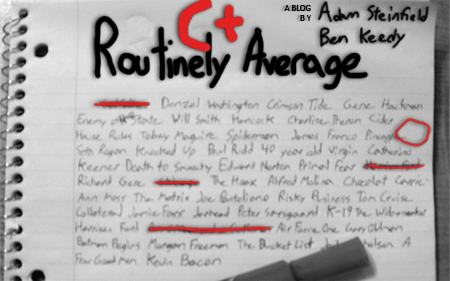A great deal of art is a reflection of the culture that spawned it. Some of the very best art holds up a mirror to that culture, putting its hypocrisies on display for all to see. In our culture there has always been a strong inclination to both aid individuals who are mentally unbalanced, and at the same time to separate them from those who do possess that balance. That begs the question, who qualifies as mentally unbalanced? Can we call someone crazy just because they are far enough outside the realm of what we consider normal? And finally, once we agree on who needs that aid, how to we go about providing it?
Milos Forman's 1975 Best Picture winning, masterpiece,
One Flew Over the Cuckoo's Nest, asks all these questions.
The film takes place on one ward in a mental hospital. The main character, Randle Patrick McMurphy, is a force of nature and a man who lives life to the fullest. In order to avoid jail time, Mac finagles his way onto the ward and immediately shakes up the inhabitants. The other men on the ward have been reduced to shadows through a strict regimen of tranquilizing medicine, and oppressive therapy. The preferred method of treatment seems to be sedation, with the intent of reverting the patients to an almost child-like state. Mac's arrival both brings them out of their stupor, and initiates a conflict with one of the all-time great screen villains in Nurse Ratched, the head of the ward.
Jack Nicholson as McMurphy is such a perfect casting decision, and the character is written so well that if nothing else had gone right, this movie would still be worth a watch. Nicholson switches back and forth from comedy to tragedy so effortlessly that it is hard to imagine another actor pulling the role off. There is an extended closeup late in the film that is jarring, thanks solely to Nicholson's ability to captivate. Mac is the heart and soul of the movie. Part of the reason the character is so wonderful is his depth given to him by both the writers, and Nicholson. In other words, they don't suger coat him. He is a violent man, prone to anger, he struggles to understand and deal with some of the more serious mental illnesses present on the ward, and he is a blatant sexist. Mac's original crime that got him thrown onto the ward is statutory rape. And yet, this makes his heroic struggle to awaken the slumbering and terrified patients all the more real.
The same principle applies to Mac's nemesis, Nurse Ratched. Stoically played by
Louis Fletcher (both Fletcher and Nicholson won Oscar's for their efforts), Ratched appears to be devoted to the care of her patients. However, as her need to control them slowly surfaces, Ratched is not demonized. One of the pivotal moments of the movie occurs as the hospital administrators discuss options to remove McMurphy from the ward, and Ratched admonishes them all for shying away from their duty to aid Mr. McMurphy.
 |
| Louise Fletcher and Brad Dourif |
The film also benefits from a number of strong performances by patients on the ward.
Brad Dourif (later famous for his role as the murderous doll Chucky), makes an Oscar nominated film debut here.
Will Sampson, also making his big screen debut, is magnificent as a large mute Native American ward member. Early appearances from screen legends like
Danny DeVito and
Christopher Lloyd give a human touch to the patients.
One Flew Over the Cuckoo's Nest is not a perfect film. Some mild sexism, an inconsistent tone, and a tendency to discount legitimate mental illnesses are all significant flaws within the story structure. Still, it makes a persuasive point while telling a very touching story, chock full of interesting characters and a career making performance by a legend in Jack Nicholson.
 |
| Jack Nicholson |
At the film's close it is unable ultimately to provide an answer to its central question. Many of the patients are clearly unfit to live and cope in the real world. However, turning them into children is not a healing process. The criticism is sharp and to the point. The larger motif of Mac as a rebel fighting agains the establishment fits nicely into the more literal plot lines, and the direction, score, and cinematography are all sharp. A true classic.
28/30












